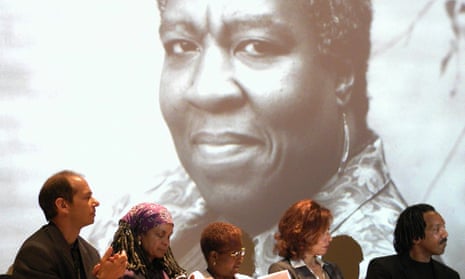In 2014, I managed to read 25 novels. All of them were written by people of colour. That was the result of a small challenge I set myself: not to read books by white authors for a year. The things I learned in my year of selective reading made me pretty glad to have persevered.
Rather than restricting myself, my decision to be conscious about what I read introduced me to books I ordinarily would not have bothered with. Instead of my usual crime/procedural/legal thrillers, I actually read some science fiction. And some fantasy. And I loved it. Saladin Ahmed’s Throne of the Crescent Moon and Nnedi Okorafor’s Who Fears Death are now two of my favourite books. I would never have heard of them had I not deliberately sought them out.
I was also lucky enough to get to read chick-lit and young adult novels with non-white central characters: Ambelin Kwaymullina’s post-apocalyptic series The Tribe, Antia Heiss’s Manhattan Dreaming and Rebecca Lim’s The Astrologer’s Daughter were particular highlights.
Part of the lesson for me there was that “ethnic” writers don’t just write “ethnic” books about “ethnic” things. As Ben Okri argues, black writers are often “expected to write about certain things, and if they don’t they are seen as irrelevant”.
What this means is that if diverse books are only valued because they can be categorised as being different per se, they are still othered. Even if writers from diverse backgrounds might do commercially well and be critically acclaimed, they face the risk of being stereotyped for their work. Valuing a writer only for their diversity, but not their humanity or talent – that’s tokenism.
In addition to the philosophical questions, I had some technical issues with this whole endeavour. The most frustrating were the practical problems, such as how difficult it was to get hold of well-known books by people of colour – even in ebook format.
For example, Toni Morrison’s Beloved could not be purchased on the Australian Kindle store for most of the year (I shall pretend that was fixed because I grumpily tweeted about it) and I still haven’t been able to access books that have been published in India.
At the beginning of 2014 I wrote in Comment is Free about why I wanted to undertake the project. Even after a year, none of the drawbacks I experienced surprised me like the comments on my original piece. Many were deleted for violating the Guardian’s community standards; it seems that people get really angry by the idea of deliberately eschewing white people, no matter the context or reason.
Although it was pretty funny that people were outraged that I wouldn’t read any Shakespeare for 12 months.
One reason why I decided to “limit” myself in this way was because I was inspired by Lilit Marcus’s Flavorwire piece about why she only read books written by women in 2013:
One difference that my book list made is that it ever-so-delicately altered the way I looked at the world. It was slow at first, but opening myself up to a variety of female perspectives made me more aware of the female lives around me … Feminism, as bell hooks pointed out, is for everyone. And when we become more aware of the small injustices and tiny everyday tragedies around us, we become better people. Reading women’s voices helped me to hear them more loudly in my daily life. Our culture is getting better and better at encouraging women to speak, but it’s not doing enough to listen to what they say when they do.
I wanted to do the same for people of colour. I feel as if my decision brought home just how white my reading world was. For whatever the reason and context, it took me until I was 30 years old to learn that Octavia E. Butler existed – how embarrassing! I’m not blaming anyone or anything for this travesty, and we all know late is better than never … but I think we can do better. I shouldn’t have needed to undertake a 12-month project to discover world class authors.
Slowly but surely, the world is noticing that “meritocracy” in the arts and entertainment industries is as fictitious as Westeros. The inherent biases in publishing and book media are real, though; one study showed that only three out of the 124 authors who appeared on the New York Times’ bestsellers list during 2012 were people of colour, and that “no African American authors made the Top 10 Bestsellers list that we looked at in 2012”.
As the blog Book Riot has pointed out, readers (that is, consumers) play a key role in addressing this:
The only way to work against the biases in our industry and the biases we carry, even if we are unaware of them, is to be deliberate in seeking out and sharing books by writers who are not white.
The “We Need Diverse Books” campaign has kicked off 2015 asking followers to pledge to read books that highlight diversity in a myriad of aspects (so not just people of colour, but looking at various inclusivity issues such as disability and gender and sexuality) with the hashtag #WNDBResolution.
I am so glad I was able to expand my reading list by making mindful choices about the books I chose last year. Those who are making similar efforts to expand their literary horizons might be similarly surprised by what they find.
